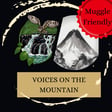Become a Creator today!Start creating today - Share your story with the world!
Start for free
00:00:00
00:00:01

Intermittent Fasting (Part II)
Does TCM agree with intermittent fasting? Who does it fit and who should be cautious? Check out this episode for some great info on how TCM approaches lifestyle choice!
This second half of the intermittent fasting episode dives deep into multiple quotes from the Nei Jing and other classics. For an introduction to the topic check out the first half!
Transcript
Keto and Dietary Changes
00:00:09
Speaker
Dude, this conversation kind of took us over into the keto diet, I feel. Oh, yeah. That's true. Because, yeah, we talked about no carbs. And so the keto diet is then going to be good for damp people. Yes. It's going to be great, good for most people, but it's really, really key for damp people. Yeah. Because this is how you stop this excess production of fluids that clearly isn't moving because dampness means stagnated fluids.
00:00:35
Speaker
Nice. And then I think the other thing is that whenever people switch diets, they're always like, Oh, it worked for a little bit. And then it stopped. Yeah. Like we get a lot of these stories, especially I have a lot of vegetarian or vegan patients. They'll be like, Oh, I felt so much better for, you know, a year or two.
00:00:53
Speaker
or maybe three, and then all this health stuff starts happening and just increases in severity. I try to point out we need to change the diet again. It worked for a little bit because there was probably some underlying stagnations that you were dealing with and you were eating good food. So true, man. So 100% true.
Vegan Diet and Climate Adaptation
00:01:11
Speaker
And that's actually really important to have a practitioner like you're saying, like Asher. Shout out to Asher, anybody in Wyoming, Hawaii, or Wyoming, just do some, you know, consults online or something. But to have a practitioner who's really paying attention and helping you guide through that lifestyle stuff, man, that's a game changer. So you're doing it exactly right for your patients, man.
00:01:33
Speaker
um because you're exactly right like is a vegan diet good well it's always good for the environment ecologically yes i was vegan for 10 years too but is a vegan diet good for our body sometimes and who's it really good for excess blocked up too much fats too much
00:01:50
Speaker
fluids, all this stuff, because it's designed to move. But if you look at vegan, unfortunately, you can't really say is veganism healthy or not, because some vegans are eating all starch all day, man. I call them starchitarians, not vegetarians. It doesn't matter if you're vegan, if you're just pounding the noodles and the rice all day, that's called a starchitarian, which again, unless they're starving, that's probably not the best way to do it.
00:02:19
Speaker
Yeah. Or depending on the environment too, I got told by one of my professors that, you know, eating, so being out in Hawaii in the tropics where it's warmer, it's like you can get away with being a fruititarian maybe because it's so cooling, but you live in such a hot environment. If you're not very active and all you're doing is meditating or something, then, then yeah, you can probably get away with
00:02:42
Speaker
that lifestyle and diet. Dude, you are so spot on. Exactly. We used to see this in Beijing when a lot of the, probably like 50 or 60% of the foreign school at the school at the university I went to, Beijing University of Chinese Medicine, about 50 or 60% of the foreign students were Koreans. And they would eat obviously the same Korean food that they had back in Korea, but they would eat it in dry, dry Beijing, not damp, damp.
00:03:09
Speaker
Korea, and they all had acne because you eat that same spicy food in a dry area. There's no more dampness to move. There's no more dampness to expel out of the body, and all that heat from the spiciness just basically sits in your body and creates what we call toxic heat, which is the foundation for pretty much all acne and lots of different dermatological things. Just because you take out the humidity factor, what was working great for this demographic now is backfire.
00:03:39
Speaker
Right? We have the same thing out here where rice is such a central part of the diet here. And it came over from, you know, China or Japan a lot. And now you're eating a bunch of rice in this hot tropical climate. And the dampness is just off the hook. It's way too much. And people are finding, they're figuring it out in a broader sense that, oh, if I just cut out rice, I feel so much better. Things are getting easier to manage. Yeah.
00:04:09
Speaker
Yeah. So true, dude.
Cacao Cultivation and Fermentation
00:04:11
Speaker
Yeah. Damp on Damp is way different than chocolate, chocolate, donut, chocolate on chocolate, good. Damp on Damp, bad. No, I'm not advocating donuts either, but you know what I mean. Well, we can advocate chocolate. We can grow chocolate out here. It's one of the few places in the States that you can grow cacao. Oh, nice. It's very lovely. Yeah. Fun. It has the whole volcanic colors. I don't grow any where I'm at, but I have grown in the past.
00:04:39
Speaker
It's a really beautiful process with a really low-tech processing. Like the aging of the beans and stuff? Yeah. You put it in a wooden box with lined with banana leaves. I love that.
00:04:53
Speaker
Yeah. And then you just move it down the box and there are flies flying in and doing all this stuff and it's fermenting and like turning pink, the, the flesh, the sweet flesh of the, of the beam that's on the outside. Ferments and decomposes a little bit. And then you take that out and you process it again and then you cook it. And that's usually the starting place then for your chocolate.
00:05:14
Speaker
Dude, I love it. You know, so many of the good things, it's so funny because you say that like the same thing happened in China. We have Dovu rule, which is really intense for foreigners at first, but if you cook it right, even foreigners tend to like it right away. My partner is not Chinese at all or Asian, but I cooked it the first time I had it. She's like, what is this? It's awesome.
00:05:36
Speaker
And I was like, well, some people call it stinky tofu, but it's really not. There is such a thing as chodofu. That's next level stinky. And that takes some time to get used to. But this one is called tofu-ru. It's just like tofu dairy. That's the word we use for dairy. But it's fermented tofu. What they'll do is they'll have a big block of tofu and they set it out and it gets fuzzy.
00:06:01
Speaker
It's the same as cheese. If any of you have seen cheese, it's just like a big block of moldy fuzz on the outside, and then they age it the right amount, which I'm sure they're quite used to. You shave off all the fuzzy parts, and on the inside, you've got this weirdly changed, ridiculously rich thing that you can make basically a cream sauce with when you saute your vegetables, and it is phenomenal. Nice. While we're here, do we have a way of understanding
00:06:28
Speaker
the fermentation process on foods and what that does? Yeah. Yeah. They, Beijing actually goes into this. They talk about how alcohol is their example. Um, and why it's absorbed so quickly into the body is because it's predigested. So in Chinese medicine, we think fermentation is predigestion, which then tells us a couple of key things. It's great for people who have really low digestive capacity.
00:06:50
Speaker
which we would call spleen deficient. And we would say, um, you can actually kind of put your spleen and stomach there. Technically, it would be connected to the stomach. And I know, I know we're crossing. You just did it, man.
Digestive Health and Misconceptions
00:07:03
Speaker
This whole, we started with, don't do it. Don't do it. And then, well, it's so true, dude. You're right.
00:07:10
Speaker
Also, here's another toughy bishaw is technically the spleen's fluid herb because it nourishes ying nutritive, which ying nutritive fluids are, they belong to the spleen, but we use that same herb to nourish the stomach and deficiency. So spleen and stomach are in the same spot. It's true. It's just their functions differ, but you got to keep me straight here. You got to keep me on track.
00:07:36
Speaker
And what do you mean by stomach yin? Is it all fluids? Is it a specific yin? It's a specific. Yeah, it's yin nutritive as well, actually. So it shares the same fluid as the spleen. So there's lots of different ways to see this. I'm sure Asher has heard me say this a million times, but for you listeners, let me start counting from one. The best reason to study formulas is that you can understand physiology.
00:08:03
Speaker
from a TCM mindset. And so we have a formula called P. U. What's actually, that's the disease is P. U. The formula is called Mazaren-1. And it deals with the very rare, what's actually, yeah, it's pretty rare. It's actually too dry of a spleen.
00:08:19
Speaker
We already said spleen likes dry, but technically there is a too dry point in the spectrum. And that's where you need to nourish ying nutritive. And as you might guess, bai sha was the key herb in there that treats the root of the problem. Da huang is the famous one because it makes people poop, because pee is classically for constipation.
00:08:38
Speaker
But it's actually technically only one kind of constipation. So people will sometimes use that as a chronic constipation formula. That's actually wrong on a couple of levels. One is there's lots of causes for chronic constipation. So you can't just use it for all kind of constipation. But two, you shouldn't really be taking dialogue long, long term. It'll damage the spleen.
00:08:58
Speaker
Because it's too moistening? Too descending. Oh, it's too descending. So dahlang is one of our strongest purging, draining downward herbs. And since the spleen can only lift, if you do lots of draining downward, you're just going to start wrecking the spleen yang's lifting ability. Gotcha. Yeah. Oh, so back to fermented foods. They're basically predigested. Yeah. So we can do a whole thing on probiotics, but
00:09:24
Speaker
because that would actually be a cool little podcast episode too. But yeah, fermentation, you can think of that as people don't need to overdo the fermented foods, just a little every day or every other day is fine. In fact, a lot of people are overdoing probiotics these days. Western medicine has kind of figured this out.
Kombucha Brewing and Fermentation
00:09:39
Speaker
Huh? What's the symptom? What happens when you start overdoing it with the probiotics? Gassy. Gassy. Yeah. Yeah. Bloaty gassy. So like kombucha is a key one and you know, different ones. I, I might, I might, uh, be building some enemies here, but I'm not a huge fan of kombucha. I know. You know what? I, I grew it myself. I did the whole thing. I had my scoby, I had it in a corner of my dorm room.
00:10:07
Speaker
I didn't hang out in that corner of my dorm room as often because for those of you who know what kombucha feels like and smells like, it's just not. It's okay. It's okay. A shed would have been better. Anyway, so the problem with the scobii is you don't know what's in it. Nobody knows what their scobii is. A scobii means a symbiotic culture of
00:10:27
Speaker
bacteria and yeast. Exactly. But it's basically what's in the air, and that's what's in your scoby. Well, you don't know if that's good or bad bacteria and yeast. And here's a really interesting telling point is one of my herb students in Costa Rica, she was making her regular kombucha batches, and we were going through the spleen strengthening and tonifying herbs. And so Baiju, or Tractyloides, I'm not going to know most of the Western names for my herbs, but I do know that one.
00:10:54
Speaker
So baiju is incredible if you're a spleen. There's just so many. It is the number one spleen tonifier. Obviously, it's not the only one and how we pair it is really important too. But she's like, well, shoot, I'm going to put that in my kombucha to make spleen boosting kombucha. How cool is that? No doubt, man. It killed her, Scobie. I'm not joking.
00:11:14
Speaker
Oh, yeah. And so what Baidu tends to do, if you want to think about it from a Western perspective as well, which is fine, as long as we think about it from a TCM perspective first for practitioners, is it basically selectively culls our microbiomes. Right. And so whatever was in that, what's that? Yeah. Well, that microbiome that would clear out of your stomach, it cleared out of the kombucha.
00:11:42
Speaker
Exactly. So maybe showing that the scoby isn't a good one for your digestion. Well, that's just it. And maybe there is a good scoby out there. If it can handle baiju, I'll drink it. But if baiju kills it, no, thank you. Right on. That's the litmus test from now on for Steven's kombucha.
00:11:59
Speaker
And actually I do really like a couple fermenting ones. So I'm a big fan of kimchi. I just don't think it should be too spicy for most environments, but it's because it has foods that call it naturally. So the three biggies are ginger, garlic, and a green vegetable called minari.
00:12:17
Speaker
And those three are the ones that tend to really cull the bacteria in the kimchi so that when we're eating it, it's pre-culled
Intermittent Fasting Practices
00:12:25
Speaker
for us. We don't have to, our body doesn't have to try and kill off the bad ones and keep the good ones. That's a lot better for the tummy. It's just a lot of kimchis are too spicy, which again, based on where you're at. But you know, honestly, spice is not really that medicinal. It's delicious. I feel like I'm making enemies left and right today.
00:12:45
Speaker
Yeah, shout out to, you know, people confuse it, but it basically is going to generate lung heat in a small or large amount, depending on how much people are eating it and how dry their climate is. Right. Or how cold and moist their climate is. Totally. Up in Volcano, we have some really spicy kimchi. Sometimes he puts cucumbers in it or whatever, but it's a local guy and it's the best kimchi. But I would never want that one when I'm down.
00:13:10
Speaker
And he will buy the ocean and it's hot and humid. I was like, no, no, no. But when it's up and cool, it's like, yeah, yeah, give me some of that spice. That's exactly right. Because it feels good, yeah. And if you're cold, it will warm up your lung. You're alone. It's just how many people deal with lung heat, right? There's such things as lung cold, too, though.
00:13:28
Speaker
Sweet. Should we do a little bit more about the classics, about where this comes from? Sure. All right. So take us away. We got some, we got some Nijin quotes coming at you. We'll do three classic quotes. Let's do the first one. This is from the Suwen chapter is called Biilun.
00:13:45
Speaker
This one is talking, sorry, I don't know chapter numbers. I guess we can put that on the notes later or something if we have a chance. But anyway, it's from the first half of the Nijing Suwen. And the original quote goes like this. It goes, yin shi tsubei, chang wei nai shang. So useful. These little eight word words are really useful. It says, when you double up your food, you harm your stomach and your intestines.
00:14:10
Speaker
Yeah. And this tells people you overeat and it really will damage. And so even if you're doing intermittent fasting, which is great, that's classically how they used to eat two meals a day. And remember, their evening meal really wasn't that late in the day either. It was like 5 p.m. It was definitely before sundown. And so if you're eating your last meal by 4 or 5 p.m., you bet you start at 6 a.m., you're still getting a 12-hour eating window.
00:14:33
Speaker
12 or 13, right? So they still did the intermittent fasting. They just had that big gap in the middle, which helps rest the spleen. And then overeating, clearly not great for the stomach. So here's the thing too, for intermittent fasting, sometimes they'll have, some people go for really little windows, which I think is still fine. It depends on what their activity level is. And again, their constitution. I've heard some people do like a three or four hour window for the whole day.
00:14:58
Speaker
But in this case, I think it's a little extreme personally, it'd be hard for me to feel fully fueled in that. But again, everybody is a little different. But the key here is those are the one demographic where if they kind of grazed for that whole three hour period, that would maybe make sense. So that would maybe be the only open invitation to graze there. Because if they just slam food for three hours,
00:15:23
Speaker
That's obviously not going to work. And if they try and make up for it because they're totally famished, they're probably going to overeat. And so that's the whole goal is try not to, you know, go to like 70%, 80% full and then rest the tummy. Yeah, that 70% is the whole, there is no try. It's the woo way for me. Yes. Because Yoda, everyone knows the Yoda quote of there is no try only do or do not.
00:15:51
Speaker
But when you see that Tai Chi man in the park doing his Tai Chi nice and slow and everything has got bends in it, you see that he's, it's effortless. He's only putting in 60, 70% effort to make that movement. And that's for me, what I see is that Wu Wei. That's interesting to kind of like put Wu Wei almost on like almost parallel with efficiency. Yeah, or yeah, yeah. Like really efficient motion.
00:16:19
Speaker
Yeah. Cause anything you do after that is excess and wasted. Yeah. Less energy, less, less work, more, like more product, right? Yeah. Yeah. Yo. All right. We do a, we do another quote. Actually, let's just, well, let's do three quotes. Yeah. We'll do another one. Let's do it. Let's do a Ling Shu if you want. Yeah. All right. Hit me. This one is, uh, Gu Bu Ru. Uh, Ban Ru, it's a Qi Shui. Yi Ru, it's a Qi Shao Yi.
00:16:48
Speaker
which means therefore when grains, sorghum, or food, it's just a metaphor. It's all pointing to food. Anyway, when food doesn't enter inward and downward into the body, meaning when we don't intake food for half a day, your chi begins to wane, and a full day of that, your chi is actually less. And so this is going back to the days where, again, they might not have been able to handle seven days of fasting just because they were so
00:17:18
Speaker
resource limited, right? But here you can see obviously there's a point where fasting becomes too much. And this is when it really starts draining people's energy. So this is something like Asher was saying too, he felt way better when he would do it. Yeah, there's a transition period for sure. But after, if you're doing intermittent fasting and you kind of ease it in over a week, and at the end of that week, you're still not feeling good, something's probably up, you know, so you might have some
00:17:43
Speaker
pathologically stuff or whatever else. You might be generating some stomach fire with all that emptiness. Right. The other thing I was thinking too is that the 24 hour eating, they're also farmers, they're workers. So that was a 24 hour time period where you were probably doing manual labor on the house or out in the fields and you weren't just meditating in the mountains because I know we have some Taoist mountain
00:18:11
Speaker
meditators that have a different practice, but there's like specific goals and environmental understandings that go with that context. So true. Like if they're not having a lot of energetic output, they don't need as much input. Right. And if you're in a deep meditative state for the entire time, your, your brain's not even using as much. So true, dude. Yeah.
Meditation and Energy Balance
00:18:35
Speaker
You can even, I mean, a lot of the great masters would use meditation as a replacement for sleep.
00:18:41
Speaker
All right. The last, last quote. All right. So this tells us too much, not great, too little, um, not great. Uh, meaning we have to get that right amount. And, and we were talking about eating when you're hungry, which I think is a great one. So from our perspective, when you're getting, when you get hungry, that basically means you're starting to get stomach heat. And when you get excessively hungry, we call that stomach fire. Um, this is a little bit of a pet peeve, but there is no such thing as good.
00:19:07
Speaker
stomach fire. So some people will be like, oh, I like to eat kimchi to boost up my stomach fire. That's kind of funny. That's being like, well, I kind of like to smoke tobacco, so it boosts up my tuberculosis. Nobody is trying to boost stomach fire, but what they mean, I think, is it warms my stomach, which is true. And how do we know things warm our stomach? You can feel it. You literally feel warmth and it starts getting
00:19:31
Speaker
And so if you feel that warmer hunger and certain foods, doger is a really gross one in China. If you guys ever want to really, it's fermented bean drink. It's just way too much. I've tried it and it's just cannot handle it. Anyway, it will, it'll make your tummy feel like that. So these are ways that you can actually increase that warmth of the stomach. And what happens is when you start getting hungry, it's your body's signal that you've got enough stomach acid.
00:19:56
Speaker
And that means you can start digesting food. When people start trying to digest food and they put food into an environment or a stomach that just can't handle it, it's just going to sit there. So people really should eat when they're hungry. And the goal is to try and regulate that so that they are hungry for their, say, two meals a day.
00:20:14
Speaker
Food feels really good and they, you know, appetite is strong. They eat that and they're not super hungry between meals. That's the sweet spot. Too much hunger, stomach fire, too little hunger. Usually, you know, spleen, but really more stomach weakness, remember? Cause stomach pulls the food in.
00:20:31
Speaker
Yeah, I'm thinking of a couple patients right now who always come in and they skip breakfast, right? They're not hungry. They're that damp type constitution. And they got a little bit of that cold. So maybe start the day with kimchi instead of congee. Do you have one more quote? Oh, yes. Let's do one more quote. We'll do another one. I got brought another Nijin quote from kind of the pathway of the food, but we'll do that one later in the Five Flavors episode.
00:20:57
Speaker
All right, so this one is from Weisheng Gu. So Gu means like a song or like, yeah, like a mnemonic. Technically, they don't usually rhyme very well, so that's why I don't love calling them songs. But we have them for acupuncture knowledge. They do even capture a lot of good information. And this one is called Weisheng Gu. All right, so it says Tai Bao Sheng Shen.
00:21:21
Speaker
So we're just going to look at that first line first.
Spiritual Health and Qi Transformation
00:21:24
Speaker
So this one is saying, when you're overly full, it harms your shun. So S-H-E-N, your shun. There's big shun, there's little shun, which means there's full body shun. That's what I'm talking about versus the heart-centric metaphysical part of the heart, which is the more specific use of that word, shun. But the key here is, it really does. When people eat too much food, they can't nourish their shun.
00:21:48
Speaker
So we can kinda go into exactly how that builds up. There's actually a wonderful Najin quote that we'll get to in the Five Flavors episode. But that tells you that it's actually not just for, say, energetic stuff, but it is, including. So remember, Full Body Shun is really focused on, you know, how someone moves, how someone talks, how they make eye contact, things like that. So really much more about human behavior. And, you know, we all know a calorie coma will shut all that down.
00:22:16
Speaker
a canack attack as we call out here. I don't like it. And then the second half says, qishang, which is excessive hunger, will harm your bones. And this will actually touch in more fully at another episode too, and we talk about how food and water get into the body and the TCM way of understanding it. But long story short is, comes into your spleen stomach, moves around with your liver's help, goes up to your heart and lungs, comes down, last song to get it.
00:22:44
Speaker
the kidneys. So apparently the kidneys, they just don't know how to call dibs, man. I mean, they constantly lose the battle. I think they're just so unselfish. Oh, that's a good way to think about it because they're generating. Yeah, that's true. Leaders eat last. It's like make sure everyone else is taken care of before you go in. That's a Greek quote, man, or sentiment. I'm not
00:23:13
Speaker
Yeah, one of the two. Yeah, exactly. So that tells you that if there's nothing left at the end, it's because
00:23:20
Speaker
you know, you didn't fuel the whole train. So that's telling us not too much, not too little. And then they actually say, which means when you're too thirsty or dehydrated, you harm your blood. This is a really key one. And it's true. You really start seeing thinner pulses and everything when people aren't drinking enough. And then if they drink too much, all that extra fluid will harm their chi. And this is because fluids will stick around and
00:23:47
Speaker
The biggest thing qi doesn't like is a big fluid blockage in front of it, because it's really hard to move through it. Blood is actually not great, but it's not as problematic. But a big, glommy ball of fluids is number one for blocking up your qi movement. And if you block up your qi movement, you're going to feel really tired. Therefore, shang qi damage your qi.
00:24:08
Speaker
I feel like the damp and flowy patients easily are the hardest to treat with just acupuncture. I always prepare them for a little bit of a longer turnaround to see effects because it's difficult. They're damp. There's so much blockage and the cheat has a rough time moving, like you said. That's such a good point, man. And dampness by nature is cloying. Also, a big one is damp is a yin pathogen. And so it's a little bit easier to deal with that with a yin
00:24:38
Speaker
Such as herbs. That's right. So yang treatment method, like acupuncture, a little harder. Yang treats yang well, he didn't treat tian well. Yeah, like treats like. Hmm. So yeah, so that's basically telling us, you know, um, and so when it comes to food, yeah, you want to make sure you're hungry for the meal and not super hungry between the meals. Those are some good takeaway guidelines. When it comes to water, ideally, you know, keep it around.
00:25:04
Speaker
You want to keep it, but there's no number of ounces or whatever else that any body should be doing. The key is look at your urine. So obviously if you're really dry, you just, you know, should be drinking. But what you really want it is like a light, light yellow. Clear water, not good. We really shouldn't be in peeing out the color of water, but we also shouldn't be peeing out like even yellow, like paper yellow kind of like legal pad yellow. That's still too much.
00:25:31
Speaker
Certainly Mountain Dew, not ideal. Neon? No, no bueno. Yeah. Yeah. So just a twinge of yellow is what our goal is. And so some people will realize, hey, I actually am over hydrating. And you're actually kind of, you know, Western medicine would say stuff like leaching your minerals out. We would say basically overloading the QIY transformation or function of the kidneys. Right. And again, the kidneys.
00:25:59
Speaker
Cause I think of them as coming in with the minerals. Yeah. Salt guides the kidneys too. Right. Yeah. So key. And then cheat transformation. Should we should have like a whole, we could do a triple burner episode just talking about cheat transformation, but that's a key one. Yeah, we will. I'm looking forward to that one. Got lots of questions about the Chihua. Nice.
00:26:24
Speaker
Yeah, it's it's so good. And unfortunately, you know, there's so many great quotes straight out of the naging. We'll bring in some good stuff here to GWAS, fundamental to understanding how fluids move in the body. And something that we never talk about in school. Are you serious? Yeah, they mentioned it. Did I mention it? No.
00:26:42
Speaker
Well, put it this way, we never specifically say chihuah. We do, and we'll go over this in episode two, we do talk about the movement of fluids from the stomach being the origins and then having the small intestine doing that split between the turbid and then large intestine I think also has a split before then finally sending it to bladder kidneys.
00:27:09
Speaker
But it's very, we learn it because it's in Machocha, but then it's quickly forgotten about and never discussed again. At least that was my experience. No, I think that's the one I've heard from all my students.
00:27:24
Speaker
There's a lot of grumbling happening on this side. What are you doing? Well, we'll fix all that, but yeah, the T transformation is super key. For a brain teaser, for all you guys who are really nerding out with us, the key here is it's actually not the transformation of Qi, it's using Qi to transform fluids.
00:27:49
Speaker
qi hua means qi transformation, because it's using qi to transform fluids. Oh, just wait. I know. Well, the thing I like about that one too, is that it reminds me of the radicals in the story that the character qi talks about. Because you're heating up the boiling water, does it have rice in it? And then it's the steam off of that. And then that there's a story of both transformation of the rice,
00:28:19
Speaker
going from a dry grain into like an edible one, and then there's the transformation of the water. And the heats roll and all that, which is the formless fire of chi. Like a pro, dude. Like a pro. You want me to throw another explode in there too? Yeah. There's an even older character for chi.
00:28:40
Speaker
The formless fire. Yeah. The formless fire. Oh, shit. I already told you that one. Yeah. Yeah. So you're right. The one that you're describing is exactly right. It's got the rice radical on the bottom and the gas radical on top. And you described it perfectly. And then the formless fire is the even more ancient one. Which I like too, because it's. Yeah. Yeah. Better translation than we got a lot of times of.
00:29:03
Speaker
Oh, it's energy. It's energy. It's vital essence and all these like, but man, can you imagine if they just would have said that it's formless fire. Yeah. Like that would have been great from the beginning. Yeah, absolutely. Yeah. That's what makes this all work. Exactly. Exactly. Otherwise we're just earth, which is beautiful, but it's not very animated, you know? Yeah, exactly.
00:29:27
Speaker
Sweet. So that was a little promo for our future episode on Chihua and the transformation of fluids in the body. Thank you.





